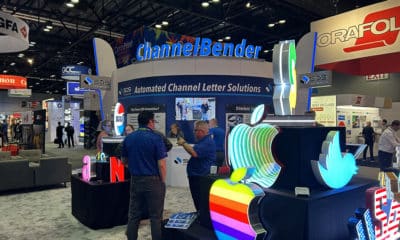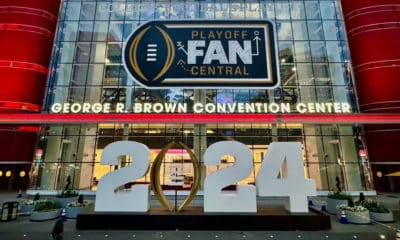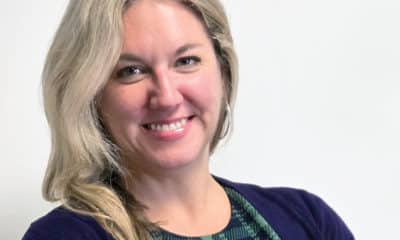Banners + Awnings
Franchise Futures
Here are some strategies the three major sign franchises are pursuing.
Published
13 years agoon
The sign franchises, as with all sign companies, have been hit hard by the recession. But each of them involves hundreds of individual signshop owners. Here are some steps they’ve taken to help combat current economic conditions.
FASTSIGNS’ new CEO takes stock
Less than two years ago, Catherine Monson took the reins as CEO at FASTSIGNS®. The economic climate in February 2009 wasn’t ideal. She spent her first several months getting to know the Fastsigns franchisees. She soon embarked on a five-month, 28-city tour to visit franchisees; she was quite impressed by their resiliency and commitment to their customers and their communities.
Early in her tenure, she launched “Operation FAST Forward,” a company-wide initiative to help franchisees grow sales, reduce costs and improve cash flow. Monson and the team negotiated lower costs with several suppliers; she credits Grimco with having been especially responsive.
“The savings we brought our franchisees helped them maintain – actually slightly improve – their Cost of Goods Sold (COGS) as a percentage of sales, despite significant price competition and price erosion. In 2008, our average COGS was 26.8%, and, in 2009, it was 26.5%,” Monson said.
Despite existing lease agreements, the team negotiated rent reductions for roughly 20% of franchisees. Additionally, Monson launched a sales incentive: awarding an all-expense-paid cruise for every franchisee who increased sales 20% from 5/1/09 to 4/30/10; more than 40 franchise couples embarked on that cruise last month.
Understanding outside sales is critical to the growth of every sign company; hiring, managing and coaching outside salespeople is one of the toughest tasks signshop owners face, Monson believes. Consequently, she launched a multi-faceted, outside-sales-support initiative of training, resources and tools for both Fastsigns sales managers and the outside salespeople. This program, launched in January 2010, has already been credited with increasing the number of outside salespeople in the Fastsigns network 150%.
“We first teach them about the sign industry, and then building on their sales skills. We have ongoing training and an online portal to facilitate sharing between the salespeople. We have created new sales-call, leave-behind material. We will hold our first annual sales conference for three days next year for outside salespeople,” Monson said.
Fastsigns has more than 300 pre-approved markets ready for development. In addition to selling new franchise locations, Monson has focused on converting appropriate existing sign companies to Fastsigns franchises. Since Fastsigns first exhibited at the United States Sign Council (USSC) Sign World show in December 2009 to promote its conversion program, five sign companies have joined the franchise.
Fastsigns also exhibited at the ISA Sign Expo in Orlando in April and the SGIA Expo in Las Vegas last month. Several other qualified, independent signshops are close to signing contracts. Primarily, Fastsigns looks at sign companies in the $250,000 to $750,000 range.
Monson described the many challenges of 2009. U.S. same-store sales declined nearly 17%. “Our franchisees faced unparalleled challenges in 2009 during the ‘Great Recession’; they worked hard and smart and persevered. It is heartbreaking to have even a single closure. We have many more success stores than failures, but we did have 18 of our 530+ centers close,” she said.
Other growth opportunities that excite Monson include digital dynamic signage (the new ecommerce system Fastsigns will launch early next year), textile printing and even some new “B2C” products.
Sales are improving significantly this year. Monson said, “Sales were up over 7% in March, over 6% in April, over 9% in May, over 8% in June, over 2% in July, and over 10% in August. And, as of today, September growth is looking strong, as well.”
Selling banners from the pole position
Morgan Smith owns a Signarama franchise store in Peterborough, ON, Canada, one of 19 Ontario stores among the franchise’s nearly 1,000 stores in 50 countries. He’s now focusing on a successful concept from one of those countries, the U.K., and a system, Citybanners™, to help him grow.
By joining Citybanners, a patented banner system, Smith can sell to end users and offer the concept to other sign companies. Currently, he’s enlisted 11 sign companies in five Canadian provinces and five U.S. states by partnering with Jonathan Duncanson-Hunter, who owns Citybanners, which is a division of Scene Media-Canada and Scene Media UK. Together, they will control expansion in North America.
They are carefully selecting companies. “Citybanners isn’t available to everyone,” Smith said. They plan to add two more distributors per week and aren’t limited to working with other Signarama franchise owners.
The program’s roots reside in the U.K., where Duncanson-Hunter started Scene Media 14 years ago. He explained, “Primarily, towns and cities purchase our system for their downtowns, with messages geared toward events, leisure, culture, the arts and public messages. But it’s also used in the commercial sector. Tesco, the U.K.’s number-one retailer, has been using the system for several years for branding in its parking lots.”
Citybanners currently has more than 300 municipal clients (including London), who have purchased approximately 35,000 units.
Last year, the University City of Cambridge celebrated its 800th anniversary. More than 225 banners festooned various poles, including one structure that was more than 140 years old.
Next up could be the biggest job yet – hundreds and hundreds of locations for the 2012 Summer Olympics in London. (The 2010 Winter Olympics Torch Relay in Vancouver used Citybanners.)
Duncanson-Hunter came to Canada in 2009 to form Scene Media Canada in February, and then he started Citybanners in July. He said he has subsequently sold approximately 1,000 Citybanners units in Ontario.
Citybanners’ nuts and bolts include a patented bracket system designed to attach banners to street-lamp poles. Especially suited to harsh climates, the brackets are designed to partially release banners at certain wind thresholds so that they can swivel, and not tear. In Canada, the intentionally durable banner material is a 22-oz., UVblockout vinyl that doesn’t require any slits or vents. That durability has a secondary, green benefit whereby used banners will be sent off and converted into bags. Duncanson-Hunter said, “We are looking at a number of opportunities and have seen the amazing finished article where the quality materials will have a second life.”
Smith wants to attract qualified companies with a turnkey program that includes a website presence and a PowerPoint presentation that can be used for marketing purposes. These sign companies would then sell complete, decorated banners.
More information can be found at www.citybanners.com or by contacting Smith or Duncanson-Hunter at Citybanners at (877) 742-7694.
No longer an island
Kirk Seager opened his Impact Signs shop in Orlando in March 1997. He wasn’t interested when the Signs Now franchise contacted him in September 2008 to suggest its MatchMaker program (see ST, December 2008, page 160). The economy changed a bit after that. Signs Now again approached him in October 2009.
This time, Seager acquiesced a bit when he was told he could have his business evaluated at no charge. He agreed, so long as he still had the option of saying no. But he ended up saying yes.
“I was tired of feeling like I was operating on Kirk’s Island. Now I feel like I’m part of the mainland. I can get technical assistance. I can get marketing assistance. I’m a lot more in touch with the sign industry. I had been doing management by the seat of my pants.”
In Signs Now’s MatchMaker program, prospective franchise owners are paired with existing sign companies, typically, people who want to be in the sign business, but not an owner in the sign business.
On the flip side, Gary Warnecke liked what he saw in the sign industry. As CFO of a goldmining M&A company, he specifically liked what he saw in both Signs Now and Impact Signs. He said he’d looked at the three major sign franchises, as well as more than a dozen sign companies over an 18-month period, before he signed on the dotted line, late in 2009.
Warnecke’s assessment is interesting, both because he’s an “outsider,” and also, due to his M&A and financial background: “I think I bought in at a very good time. The sign industry should do very well when the economy rebounds. It’s changing, with lot of new technology. Plus, no matter how bad things get, there will always be a need for signs.”
For Seager, the year-long transformation is nearly complete. In hindsight, he thinks it would’ve been easier to start from scratch than to “undo and rebrand” his signshop. His org chart has been revamped, and now he can concentrate on sales. His former production manager is now his general manager, with such duties as HR and maintenance. As for Warnecke, Seager says “he’s the checks and balances guy.”
For Warnecke, the 20% increase in sales since the time of purchase has reinforced his confidence in what he considered “an experiment.” He primarily takes a hands-off stance, with the exception of being “a little bit involved in the marketing, because that requires capital,” and allowing Seager to run the show “with my guidance.”
Seager appreciates the corporate-marketing materials Signs Now provides, and Warnecke shakes his head at what he sees from other sign companies: “I don’t understand why sign companies don’t spend more time with their customers. It seems like they often just take the order.”
Seager also likes the corporate software assistance. He’d purchased Cyrious Software’s SMS Software back in May 2006, but he couldn’t understand and appreciate all of its features on his own. With some franchise help, he’s one of the first companies to now use Cyrious’ newer Control software.
Signs Now’s parent company, Allegra, whose origins are with quick-printing franchises, began a MatchMaker program in 2002. It has 43 companies currently participating, with four more in the wings. Seager and Warnecke are one of 10 MatchMaker pairings for Signs Now, and three more are in development.

SPONSORED VIDEO
Introducing the Sign Industry Podcast
The Sign Industry Podcast is a platform for every sign person out there — from the old-timers who bent neon and hand-lettered boats to those venturing into new technologies — we want to get their stories out for everyone to hear. Come join us and listen to stories, learn tricks or techniques, and get insights of what’s to come. We are the world’s second oldest profession. The folks who started the world’s oldest profession needed a sign.
You may like

NUtec Digital Ink Invests in Solar Energy for Facility

5 Reasons to Sell a Sign Company Plus 6 Options

21 Larry Albright Plasma Globes, Crackle Tubes and More
Subscribe

Bulletins
Get the most important news and business ideas from Signs of the Times magazine's news bulletin.
Most Popular
-

 Tip Sheet2 weeks ago
Tip Sheet2 weeks agoAlways Brand Yourself and Wear Fewer Hats — Two of April’s Sign Tips
-

 Photo Gallery4 days ago
Photo Gallery4 days ago30 Snapshots of the 2024 ISA Sign Expo
-

 Ask Signs of the Times6 days ago
Ask Signs of the Times6 days agoWhy Are Signs from Canva so Overloaded and Similar?
-

 Real Deal2 weeks ago
Real Deal2 weeks agoA Woman Sign Company Owner Confronts a Sexist Wholesaler
-

 Paula Fargo1 day ago
Paula Fargo1 day ago5 Reasons to Sell a Sign Company Plus 6 Options
-

 Benchmarks1 week ago
Benchmarks1 week ago6 Sports Venue Signs Deserving a Standing Ovation
-

 Photo Gallery1 day ago
Photo Gallery1 day ago21 Larry Albright Plasma Globes, Crackle Tubes and More
-

 Women in Signs2 weeks ago
Women in Signs2 weeks ago2024 Women in Signs: Megan Bradley










